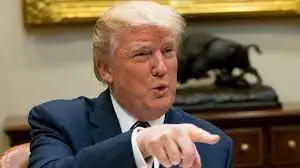Trump’s ‘Good Luck’ Message to Canada Draws Sharp Response From Political Leaders

Former U.S. President Donald Trump once again stirred controversy — this time north of the border. On Monday, Trump offered a brief but pointed message to Canadians as the country gears up for its federal election: “Good luck, you’ll need it!” His comment, delivered during an event in Michigan, quickly made waves across Canada and prompted strong reactions, particularly from Conservative Party leader Pierre Poilievre, who is running to become the next prime minister.
While Trump’s statement was brief, it carried a clear implication. Many Canadians interpreted it as a veiled critique of the country’s political climate and leadership under Prime Minister Justin Trudeau. Trump’s choice of words suggested he believes Canadians are facing tough times — and that change is necessary for improvement.
Trump’s “Good Luck” Remark: Offhanded or Intentional?
The former U.S. president made his comments during a campaign-style rally where he touched on a range of topics, from the American economy to foreign affairs. As he spoke about America’s relationship with Canada, Trump paused and said with a smirk, “Good luck, Canada. You’re going to need it.”
Trump did not clarify whether he aimed the remark directly at Trudeau’s administration or the broader political scene. However, many observers saw it as a jab at Canada’s current leadership. His relationship with Trudeau during his presidency was often tense, marked by public disagreements over trade policies, NATO funding, and climate initiatives.
Given Trump’s history of making unfiltered remarks, analysts suggested that he likely intended to stir conversation rather than offer sincere well-wishes — a tactic he has used many times before.
Poilievre’s Swift and Sharp Response
Pierre Poilievre, the leader of Canada’s Conservative Party and a major contender for the prime minister’s office, quickly responded. Speaking at a press conference in Vancouver, Poilievre tackled Trump’s comments directly.
“Canadians don’t need luck — we need leadership,” Poilievre declared. “Our country has the resources, talent, and resilience to thrive. What we are missing right now is competent leadership at the federal level.”
Poilievre emphasized his focus on offering Canadians a positive vision for the future, one based on strengthening the economy, securing national borders, and promoting individual freedom. He made it clear that, while he respects international interest in Canadian politics, he believes Canada needs “Canadian-made solutions to Canadian-made problems.”
Without directly criticizing Trump, Poilievre subtly distanced himself from the former U.S. president, appealing to voters who are wary of American political influence.
Reaction Across the Political Spectrum
Canadian political leaders and citizens responded to Trump’s remark with mixed reactions. Liberal supporters, many of whom have long criticized Trump, dismissed his comments as irrelevant.
A spokesperson for Prime Minister Trudeau’s campaign downplayed the remarks, saying, “We are focused on Canadians and their priorities. The opinions of a former foreign leader do not determine our country’s future.”
On social media, the remark sparked a flurry of opinions. Some Canadians agreed with Trump’s sentiment, saying Canada faces real struggles with rising costs of living, housing shortages, and healthcare system pressures. Others saw the comment as an unnecessary intrusion into Canada’s democratic process.
Political analysts noted that Trump’s involvement — even indirectly — could complicate matters for Poilievre. Aligning too closely with Trump risks alienating moderate voters, while openly opposing him could upset segments of the Conservative base that admire Trump’s populist approach.
Broader Context: Cross-Border Tensions
Trump’s comment touches on deeper tensions between Canada and the U.S. during and after his presidency. Trade disputes over steel, aluminum, and dairy products created friction between the two countries. His administration’s renegotiation of NAFTA, which led to the USMCA (United States-Mexico-Canada Agreement), reflected a more aggressive approach that many Canadians found disrespectful.
Moreover, Trump’s unilateral and nationalist foreign policy style often clashed with Trudeau’s multilateral, diplomacy-first approach.
Even today, with Trump campaigning for a possible return to the White House, his influence on international politics remains strong. His comments serve as a reminder that American political discourse often impacts Canada — whether Canadians want it or not.
The Road Ahead
As Canadians prepare to head to the polls, Trump’s “good luck” remark probably won’t be a central election issue. However, it highlights how intertwined Canadian and American politics have become — and how political figures from both countries continue to shape each other’s narratives.
For Pierre Poilievre, the path remains clear: he must convince Canadians that he offers the leadership and vision they need, regardless of what foreign politicians say.
“At the end of the day,” Poilievre said, “it’s not about luck. It’s about hard work, smart policies, and believing in Canadians’ ability to succeed.”
Meanwhile, Trump’s comments remind everyone that no matter how the election unfolds, the world is watching — and ready to weigh in.






